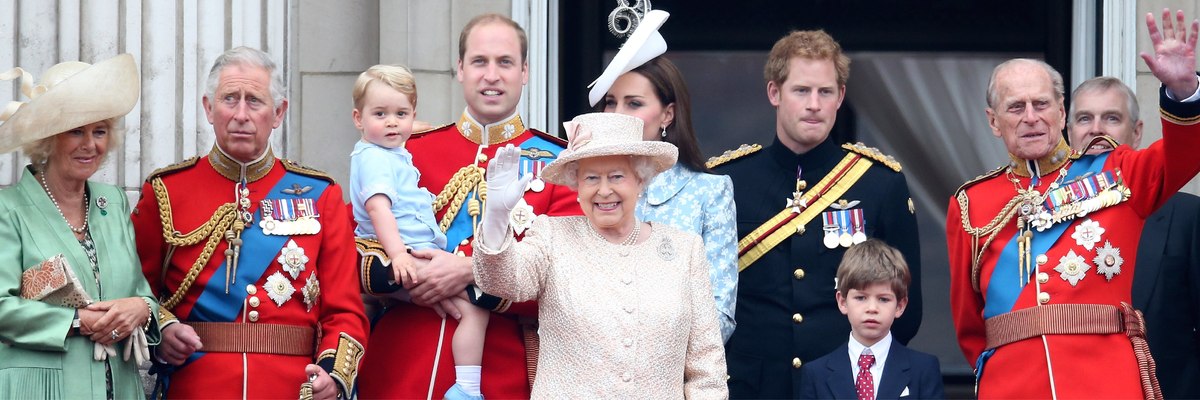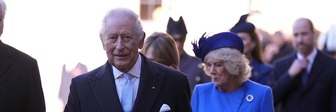It seems that the Harry and Meghan interview has divided the country into two angry camps: one that is outraged by what has allegedly been revealed about racism and indifference to mental health within the Royal Family; the other, outraged that the Royal Family has been the public target (and from among its own) of unsubstantiated accusations which it cannot publicly challenge. Polls suggest most young people inhabit the first camp, most older people the second. But at the root of the confrontation may be a much deeper opposition between two closely-related but seemingly incompatible cultures at work in society: celebrity culture and the culture that sustains monarchy. Can they be squared, or will the first, which seems to have all the energy of youth about it, drive out the second?
The most obvious contrast between the two is that celebrity culture, of which Oprah Winfrey is the indisputable queen, is all about maximum exposure. The monarchy is all about minimal exposure - or at least maximally-controlled exposure. Hence Harry and Meghan were afforded two hours of prime-time television to ‘bare all’ while the monarchy eschews all such ‘personal’ interviewing and had to fall back on a terse, and largely formal written statement in response, a statement that pointedly said that any issues arising would be handled ‘privately’.
The clash between the two cultures is essentially between letting it all hang out and desperately trying to hold it all in. In the end, the result of any ultimate shoot-out between the two will be determined by which culture the public favours more.
Celebrity culture lives off exposure. Celebrities have famously been defined as people who are famous for being famous, so the more exposure, the more fame. The culture is sustained by public appetite: we want to know more and more about the celebrities we love (or loath) and to know more and more about them at a personal level. The more the exposure is personal, the more the audience can identify with their celebrity of choice. So if a celebrity confesses all in an interview about the trauma of divorce struggling to fight off a drink problem, how becoming a parent has changed their lives, how friends mean everything, how they sincerely believe there’s nothing more important than compassion and so on, the audience can feel empathy because their own lives touch on such things too.
What matters most is a convincing story, heartfelt and coherent. Whether it’s actually true, though, is, at best, of secondary importance. We have started to talk about ‘his truth’ and ‘her truth’ rather than ‘the truth’, and you won’t find an interviewer interrupting a celebrity in full confessional mode with a sceptical, challenging supplementary along the lines of: ‘Hang on… you said a few minutes ago… .’ That’s not Oprah’s bag. So the ‘bare all’ account could be a complete fantasy, but it seems that nobody much minds whether it reflects the truth or not. Celebrity culture is a collusion between audience and celebrity to manufacture a fantasy which the audience finds titillating and the celebrity can cash in on.
Monarchy too is based on a fantasy, but an utterly different one. Here the fantasy is of an institution that embodies the unchanging and the permanent. The promise – or, rather, the fantasy - is that monarchy can guarantee continuity and order in an ever-changing world. That requires the maintenance of a certain sense of mystery, of a sort of holy of holies forever hidden behind a façade. It follows that, to sustain such a fantasy, exposure should be kept to a minimum. And, most importantly, the ‘personal’ must be effectively ruled out altogether. It’s not for nothing that the Queen has never done an interview.
I once cheekily asked her whether she might one day change her mind and allow herself to be interviewed. Her reply was immediate: ‘If I did, it certainly would not be with you, Mr Humphrys!’ I suspect Oprah Winfrey would be even further down the list – and now certainly off it altogether. The most that adherents of celebrity culture might hope for would be a brief interview conducted by a correspondent from the Racing Post.
These two cultures, of celebrity and monarchy, might happily co-exist if it were not for one awkward fact: monarchy cannot avoid celebrity because royal families are already celebrities. It comes with the turf. Indeed the British Royal Family is up there with the most celebrated celebrities on the planet. That makes the movers and shakers behind celebrity culture ever more desperate to expose them as much as possible. Oprah is at the top of that pyramid. She knows that if you want the biggest prizes you have to play a long game, which is what she did with Meghan.
For a monarchy that can’t shake off celebrity, maintaining a balance between the conflicting demands of the two cultures is like walking a tightrope. Even her critics (and there are fewer and fewer by the year) would concede that the Queen has been the supreme expert at this difficult art, practised now for nearly seventy years, with only a few wobbles.
Those wobbles have tended to come when one of the senior figures in “the firm” opts for celebrity exposure over monarchical restraint. The Queen has seen this happen several times since, at the age of ten, she became Princess of Wales. Her uncle, Edward VIII, ‘imported’ celebrity into the Royal Family in the form of an American divorcee, Wallis Simpson, and his subsequent abdication put the Queen’s father on the throne. It could be said to have happened again when the breakdown of her eldest son’s marriage turned her successor as princess of Wales from being primarily a member of ‘the Firm’ into a celebrity: Diana was now up for giving ‘bare-all’ interviews.
But neither was so spectacular a shift from one culture to the other as the latest. Prince Harry married someone who was already, as an American actress, very much at home in celebrity culture. Then he walked out on his grandmother, father and brother straight into the embrace of queen Oprah. Two hours later and the country was split into contending camps, each spitting vitriol at the other. The 94-year-old Queen, whose whole role is to try to keep the nation united, faced the most difficult test of her balancing skills thus far.
Republicans, of course, rejoice. There are many different arguments in the Republican case but one of them might be that having a president as head of state would dispose of the threat that is posed by celebrity culture A here-today-gone-tomorrow president with no hang-on family whom anyone would have the slightest interest in, could simply get on with the boring aspects of the job without any risk that Oprah would be sniffing about trying to find someone to spill some beans. R at least that’s the assumption.
It might seem a neat solution but there’s a problem here too. If we dumped the monarchy for a titular, non-executive presidency, presidents would almost certainly have to be elected by the public. If Parliament tried to do the choosing itself, charges of elitism would soon put paid to that. But who would we choose? Might this not be exactly the way back for celebrity culture? Celebrities would certainly be tempted to run and we might have become so enamoured of the stories they’d told about themselves on daytime television sofas that we’d vote for them.
Try an experiment yourselves. Who would we elect if there were a contest tomorrow? Maybe a recent winner of Strictly or Celebrity Masterchef. Or, in this newly polarised world, maybe there would be a straight fight between Meghan herself and her most outspoken critic among the community of celebrities, Piers Morgan (now contemplating a new job). If you think such speculation too frivolous, maybe we’d opt for a recent hero: Marcus Rashford, perhaps, though I suspect he’d have more sense than to run. Or, if we British are as fundamentally sensible as we like to think we are, the victor would be someone who not only has celebrity, but who has the wisdom of years and who commands near-universal respect. Sir David Attenborough springs instantly to mind.
But Sir David would be the first to admit that, on these criteria, there is someone who beats even him: his old friend, the Queen herself. It is a measure of her balancing skills that this should be so. And there is very much more to her achievement than is caught in Alan Bennett’s old quip. In Britain, he liked to say, ‘if you get to be ninety and can still eat a boiled egg, they want to nominate you for a Nobel Prize’.
In short, then, it could be said that the Queen has managed to square the circle between the cultures of monarchy and celebrity and that whatever other arguments
there may be for a republic, the inability of a monarch to do so isn’t one of them. But her accomplishment invites the obvious question: will Charles, William and (if the monarchy lasts that long) young Prince George be as successful at pulling off this trick as the woman who has been doing so day in and day out since I was nine-years-old?
We cannot know, but the outcome probably depends on the answer to perhaps an even more crucial question, and that’s about us not them. It rests on which fantasy we are happiest buying into. Is it the fantasy of personal exposure and revelation (whether true or not) which is peddled by celebrity culture? Or is it the fantasy of a half-exposed, half-concealed family charged with responsibility for keeping the show on the road and all of us united?
Let us know your thoughts.






